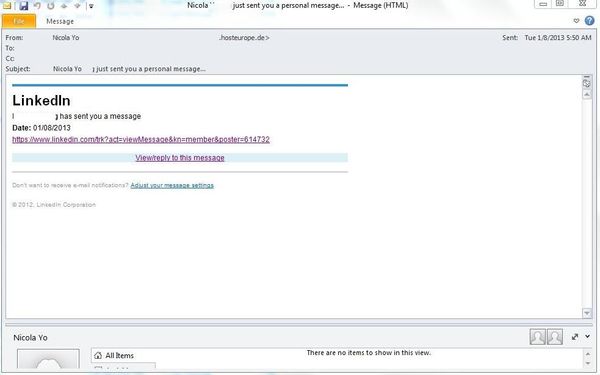Bogus LinkedIn Messages Speculate Work Comeback to Infect Users with Trojans

Malware writers are again taking advantage of LinkedIn’s popularity and users’ social media engagement after the holidays. With many people back to work and eager to strengthen their professional connections, the malicious campaign comes in really handy for the attackers.
 The New Year opened with an aggressive spam campaign that infects LinkedIn account holders with Trojans and other malicious software hosted on US, UK, Russian or Italian domains. Victims receive what appears to be a private e-mail from potential connections but are instead redirected to malware-hosting web sites. If this can be called “good luck” some land on phishing pages that grab their personal data to use for identity theft and fraud.
The New Year opened with an aggressive spam campaign that infects LinkedIn account holders with Trojans and other malicious software hosted on US, UK, Russian or Italian domains. Victims receive what appears to be a private e-mail from potential connections but are instead redirected to malware-hosting web sites. If this can be called “good luck” some land on phishing pages that grab their personal data to use for identity theft and fraud.
One website identified by Bitdefender that is spreading in fake LinkedIn spam hosted Trojan JS BlacoleRef W. Difficult to eradicate, this Trojan takes control of the device to steal credentials or credit card data. It can also hijack the user’s address book to spam contacts with dangerous attachments.
To stay away from malware, phishing and other e-threats, users are advised to install antivirus software and keep it updated. It can instantly block spam but also malicious websites where users accidentally land on.
 Search engines such as Google also block some of the dangerous websites spreading through the LinkedIn scam because they are installing malicious software without user consent. The web giant’s Safe Browsing tool listed the links as suspicious and warned users that accessing them may harm their computers. One of the websites was providing warm “shelter” for no less than 8 Trojans.
Search engines such as Google also block some of the dangerous websites spreading through the LinkedIn scam because they are installing malicious software without user consent. The web giant’s Safe Browsing tool listed the links as suspicious and warned users that accessing them may harm their computers. One of the websites was providing warm “shelter” for no less than 8 Trojans.
 At the same time, Facebook users are under fire from Java Script Trojans spreading through messages such as “Hi baby, please check my facebook profile”. Scammers even use authentic pictures of international models grabbed from their social network accounts.
At the same time, Facebook users are under fire from Java Script Trojans spreading through messages such as “Hi baby, please check my facebook profile”. Scammers even use authentic pictures of international models grabbed from their social network accounts.
In June 2012, we also detected a widespread Trojan campaign that infected computers after posing as a “LinkedIn” attachment.
According to a Bitdefender survey, Trojans account for 83-percent of the global malware detected in the world. Trojan-type infections go hand-in-hand with botnets: approximately 15 percent of computers are part of networks controlled by cyber-criminals.
This article is based on the samples provided by Daniel Ichim, Bitdefender Spam Researcher.
All product and company names mentioned herein are for identification purposes only and are the property of, and may be trademarks of, their respective owners.
tags
Author
Bianca Stanescu, the fiercest warrior princess in the Bitdefender news palace, is a down-to-earth journalist, who's always on to a cybertrendy story.
View all postsRight now Top posts
How to Protect Your WhatsApp from Hackers and Scammers – 8 Key Settings and Best Practices
April 03, 2025
Outpacing Cyberthreats: Bitdefender Together with Scuderia Ferrari HP in 2025
March 12, 2025
Streamjacking Scams On YouTube Leverage CS2 Pro Player Championships to Defraud Gamers
February 20, 2025
How to Identify and Protect Yourself from Gaming Laptop Scams
February 11, 2025
FOLLOW US ON SOCIAL MEDIA
You might also like
Bookmarks








